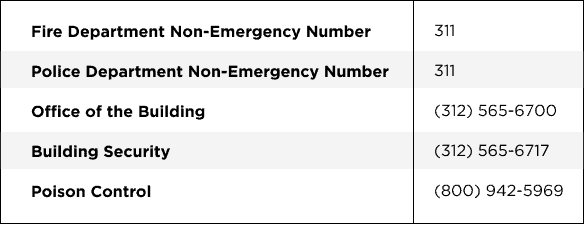Emergency Procedures
GENERAL INFORMATION
The first procedure in any crisis is to call Police / Fire / Rescue at 911 and then the Building Security Emergency number listed below.
Building Security Emergency number
- Building Security should be notified anytime 911 is called so that building personnel can direct the emergency crew to the nearest entrance and quickest route to your suite.
- The City of Chicago requires each company to develop an Emergency Team. The team members are trained by the Building’s Fire Safety Director to help communicate with and direct coworkers during emergency situations.
- Each company should update their Office and Fire Safety contacts at least twice a year, or as changes occur.
For emergency procedures in a specific crisis, please refer to the online fire & life safety training presentation.
RUN, HIDE OR FIGHT
EMERGENCY CONTACTS
DIAL 9-1-1 IN EMERGENCY FOR FIRE, POLICE, MEDICAL, AMBULANCE
If you call 9-1-1 for a medical emergency, please be sure to notify Building Security at (312) 565-6717 with your name, call-back number, and location so that they can guide the paramedics to the correct place. In an alarm situation, unless you have something to report, please do not call Building Security.
Building Security needs to attend to the situation, whether it is a false alarm or a true emergency, and telephone lines must be kept clear in the event of an emergency.

BOMB THREAT
Because not all bomb threats are the same, good judgment and the cooperation of employees are especially necessary. A particular area or floor, a number of floors, or possibly the entire building may have to be relocated in the event of a bomb threat.
In the event that a bomb threat is phoned into your office, it is imperative that the person receiving the threat not risk breaking the telephone connection by attempting to transfer the call. Have someone else call 9-1-1 to report the call. The call should be extended for as long as possible, gathering as much information as possible and perhaps having the call traced.
Immediate arbitrary relocation or evacuation is not recommended. If the City Police or Fire Department suggest that you evacuate your area due to a bomb threat, it is important to have personnel first make a visual search of their own desks and surrounding areas. Since the employees are familiar with the workplace surroundings and what belongs (or doesn’t belong) they are more likely to be able to identify any unusual items. Suspicious items could include boxes, cigarette packs, bags or purses, etc. If a suspicious item is located, do not touch it or cover it.
In case of an evacuation due to a bomb threat, the elevators can be used. However, in the case of a bomb explosion or fire, you should not use elevators, unless specifically instructed by Fire Department or Police to do so. It is also good practice to assign someone to make a final inspection of the area to be sure everyone has been relocated.
The Office of the Building will quickly make a search of the public areas involved. They will also assist the Police and Fire Departments in searching the Tenant areas. Whenever possible, the Tenant should have representatives available to assist with the search of areas requested.
Please be sure that all employees have the bomb threat checklist handy at their desks. As much detail as possible should be recorded and all descriptions that apply should be checked off or circled.
MEDICAL EMERGENCY
If you, or someone in your area, needs immediate medical help, inform the nearest person to phone 9-1-1 for help. If no one is around, immediately dial 9-1-1 from the closest telephone. Be sure to give your name, the building name and address, your floor and location, and your telephone number. Inform the Office of the Building or Building Security that you have called 9-1-1 and that an emergency team will be arriving.
Give them your name, phone number and location so they can recall an elevator and guide the response team to the correct place.
CIVIL DISTURBANCE
In the event of a civil disturbance:
- Do not go through an unruly crowd to exit or enter the building.
- If there is violence involved, call 9-1-1
- Inform them of the situation and answer questions asked by the operator.
SEVERE WEATHER
The U.S. Weather Bureau describes conditions by two (2) classifications, a Watch or a Warning. This applies to the reporting of severe thunderstorms, the approach of weather conditions favoring the formation of tornadoes, a hurricane condition, a winter storm condition, etc.
- A Watch becomes effective when atmospheric conditions are right to produce the particular weather phenomenon.
- A Warning means that the weather condition has been spotted and prompt action must be taken for safety.
Except in very rare circumstances, the decision to evacuate the building based on the above weather reports will not be made by the Office of the Building, but rather by each Tenant Company.
However, in the event these conditions do exist, the following guidelines should be kept in mind:
- Move away from outside windows. If the windows in your offices are supplied with blinds, close the blinds (this will provide protection from broken glass).
- Do not panic.
- If evacuated, lock all desk drawers and take all items of value with you.
- If evacuated, use a route that is in the building interior and stay away from large expanses of glass and windows.
- Use the stairwells rather than the elevators.
- If evacuated, do not return to your office until advised to do so.